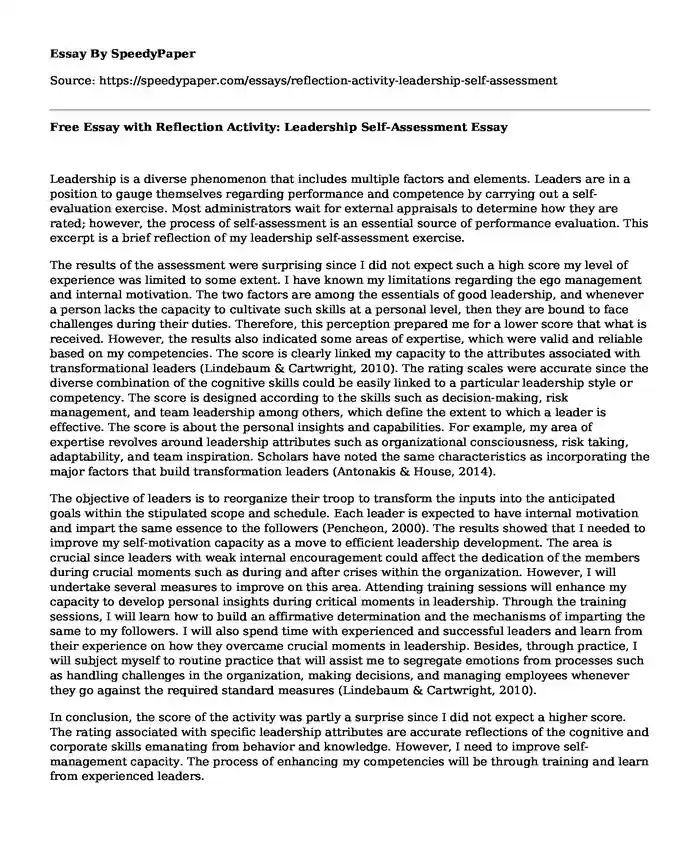
| Type of paper: | Essay |
| Categories: | Leadership analysis |
| Pages: | 3 |
| Wordcount: | 612 words |
Leadership is a diverse phenomenon that includes multiple factors and elements. Leaders are in a position to gauge themselves regarding performance and competence by carrying out a self-evaluation exercise. Most administrators wait for external appraisals to determine how they are rated; however, the process of self-assessment is an essential source of performance evaluation. This excerpt is a brief reflection of my leadership self-assessment exercise.
The results of the assessment were surprising since I did not expect such a high score my level of experience was limited to some extent. I have known my limitations regarding the ego management and internal motivation. The two factors are among the essentials of good leadership, and whenever a person lacks the capacity to cultivate such skills at a personal level, then they are bound to face challenges during their duties. Therefore, this perception prepared me for a lower score that what is received. However, the results also indicated some areas of expertise, which were valid and reliable based on my competencies. The score is clearly linked my capacity to the attributes associated with transformational leaders (Lindebaum & Cartwright, 2010). The rating scales were accurate since the diverse combination of the cognitive skills could be easily linked to a particular leadership style or competency. The score is designed according to the skills such as decision-making, risk management, and team leadership among others, which define the extent to which a leader is effective. The score is about the personal insights and capabilities. For example, my area of expertise revolves around leadership attributes such as organizational consciousness, risk taking, adaptability, and team inspiration. Scholars have noted the same characteristics as incorporating the major factors that build transformation leaders (Antonakis & House, 2014).
The objective of leaders is to reorganize their troop to transform the inputs into the anticipated goals within the stipulated scope and schedule. Each leader is expected to have internal motivation and impart the same essence to the followers (Pencheon, 2000). The results showed that I needed to improve my self-motivation capacity as a move to efficient leadership development. The area is crucial since leaders with weak internal encouragement could affect the dedication of the members during crucial moments such as during and after crises within the organization. However, I will undertake several measures to improve on this area. Attending training sessions will enhance my capacity to develop personal insights during critical moments in leadership. Through the training sessions, I will learn how to build an affirmative determination and the mechanisms of imparting the same to my followers. I will also spend time with experienced and successful leaders and learn from their experience on how they overcame crucial moments in leadership. Besides, through practice, I will subject myself to routine practice that will assist me to segregate emotions from processes such as handling challenges in the organization, making decisions, and managing employees whenever they go against the required standard measures (Lindebaum & Cartwright, 2010).
In conclusion, the score of the activity was partly a surprise since I did not expect a higher score. The rating associated with specific leadership attributes are accurate reflections of the cognitive and corporate skills emanating from behavior and knowledge. However, I need to improve self-management capacity. The process of enhancing my competencies will be through training and learn from experienced leaders.
References
Antonakis, J., & House, R. J. (2014). Instrumental leadership: Measurement and extension of transformationaltransactional leadership theory. The Leadership Quarterly, 25(4), 746771. http://doi.org/10.1016/j.leaqua.2014.04.005
Lindebaum, D., & Cartwright, S. (2010). A critical examination of the relationship between emotional intelligence and Transformational leadership. Journal of Management Studies, nono. http://doi.org/10.1111/j.1467-6486.2010.00933.x
Pencheon, D. (2000). Leadership and motivation. BMJ, 321(7256), 22.http://doi.org/10.1136/bmj.321.7256.s2-7256
Cite this page
Free Essay with Reflection Activity: Leadership Self-Assessment. (2019, Oct 15). Retrieved from https://speedypaper.net/essays/reflection-activity-leadership-self-assessment
Request Removal
If you are the original author of this essay and no longer wish to have it published on the SpeedyPaper website, please click below to request its removal:
- Free Essay Describing the Gun Ownership Issue in the United States
- HRM Essay Example: Sustaining Employee Performance
- Essay Example: The Environmental Costs and Benefits of Fracking
- Does Free Trade Help or Hurt the Developing Countries? Free Essay Answers
- Impacts of the French Revolution and Industrial Revolutions, Free Essay in History
- Essay Sample on Romantic Period of Poetry Masterpieces - Experiencing Poetry
- Paper Example. The Quality of Leaders
Popular categories




